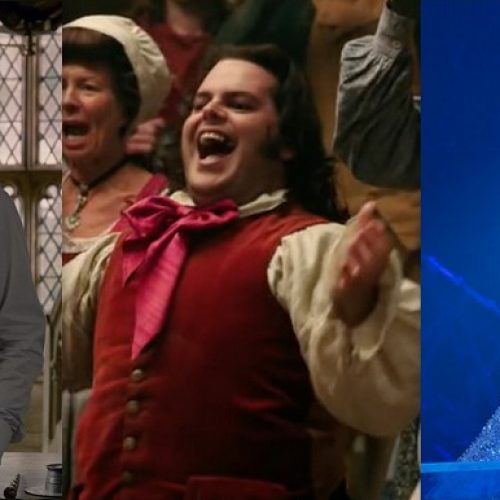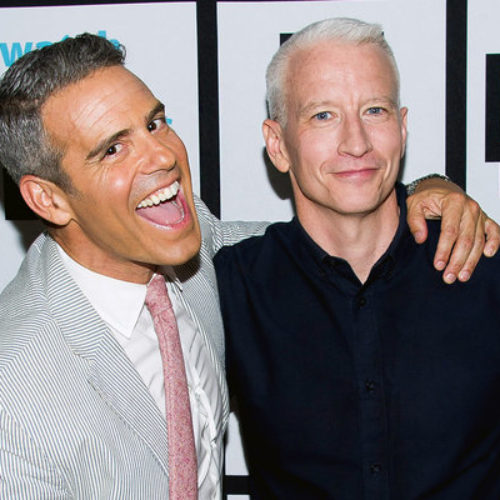Opinion: ‘Will & Grace’ Tackling Bisexual Erasure Does More Harm Than Good
Originally published on TVLine
In the Thursday February 6 episode of Will & Grace, the NBC series clumsily attempted to tackle biphobic beliefs and yet stumbled throughout, relying on lazy jokes and tired stereotypes.
In the episode titled “Bi-Plane,” Grace’s niece Fiona (played by the late Debbie Reynolds’ granddaughter, Billie Lourd) visits her aunt and brings along Trevor (Peter Graham), a flamboyant 22-year-old with a love for musicals. Will and Grace both quickly assume that Trevor is the gay BFF — a miniature mirror image of the two of them. They’re shocked when Fiona reveals that Trevor is her boyfriend, and that he’s bisexual.
It’s immediately clear that neither Will nor Grace believes Trevor, so what follows is a lot of biphobic jokes with tired punchlines. Will proclaims that “bisexuality isn’t even a thing,” inanely comparing it to someone saying they’re a cat and dog person instead of choosing just one. Will tells Trevor that sometimes saying you’re bi is “a safe half-step when you’re scared to jump all the way in,” implying that Trevor is actually gay. Later, Will strips away the implications and says it explicitly: “Trevor, you’re not bisexual, you’re gay.”
Will goes on to tell Trevor that he’s only choosing to be with a woman because of “societal pressure” and exasperatedly claims that, within the LGBTQ community, “The ‘B’s and the ‘Q’s just haven’t figured out if they’re ‘L’ or ‘G’ yet.” Grace generally agrees with Will but is scared to admit as much—she wants to be seen as the cool aunt—but eventually does admit that she also doesn’t think Trevor is being honest with himself.
“Bi-Plane” reads like a bullet point list of all the things bisexual people hear constantly—and the things that frequently keep bisexual people from coming out (and bisexuals are the least likely group to come out). Hearing over and over that bisexuality isn’t real, or that it’s just a stepping stone before inevitably identifying as gay or lesbian, can cause bisexuals to doubt their own feelings and desires. Such biphobia and bisexual erasure contributes to heightened mental health issues within the bisexual community, and plots like this don’t do anything to help.
This bisexual erasure is especially hurtful when it comes from the queer community—which should, ostensibly, be the place we feel safest—which is why it’s doubly frustrating that Will & Grace is the series choosing to do this storyline.
Will & Grace has always had a huge platform and has been credited with “normalizing” queer relationships on television. The original run also contained biphobia (…as well as transphobia and lesbophobia) and its return could’ve been a way to make up for its past mistakes. Instead, Will & Grace hasn’t changed much and in some instances, it’s even gotten worse — such as last year’s season finale that found Karen, whose bisexuality has been a running gag throughout the entire series, unequivocally coming out as straight. (And what’s worse, her “coming out” scene was a reference to Ellen‘s famous “The Puppy Episode.”)
Instead of using “Bi-Plane” to clearly dispel the common myths about bisexuality, the show leaned into them even further. Though it is clear that we’re meant to be on Fiona and Trevor’s side, the episode doesn’t do much to showcase just how wrong and harmful Will and Grace’s beliefs are. At the end, Will admits they were both being “intolerant of someone’s sexuality” and claims that “when we were shamed into it, we were willing to learn” — but we don’t actually see that at all. There is no moment when either character apologizes to Trevor, or indicates that they learned anything (except, I suppose, to keep their biphobia to themselves). Instead, we get a tired joke about how they just don’t understand because they’re old and stuck in the ’90s (as if bisexuality is a recent development).
Will & Grace has always been a show that centered solely on cis gay men while ignoring the rest of the queer community, and it’s sad to see that it’s still the case—22 years after it first premiered. It just further proves that television should focus on finding new queer creators for new queer series instead of dipping into the past.
About author
You might also like
Opinion: I’m Tired of Major Studio Movies’ Trivial ‘Gay’ Moments
The cast of Fantastic Beasts: The Crimes of Grindelwald appeared on the Today Show to share the first full-length trailer for the J.K. Rowling-penned movie, which featured a “gay” moment
Why Andy Cohen, Anderson Cooper and the Gold Star Gays aren’t a good thing
Originally published on quartzy.qz.com Everyone knows that Bravo TV’s Andy Cohen is gay. But it wasn’t until recently that we learned he’s a Gold Star Gay. Unfamiliar with the term?
Troye Sivan’s ‘Bloom’ Elegantly Combats Bottom Shame
In the wonderful world of gay sex, “bloom” can mean many things: a hole stretching open around a cock, a gape after that first slick pull-out, or a rosebud (or










5 Comments
Black Dynasty
February 15, 11:31I think this piece missed the entire point of the episode. A lot of gay and str8 folks still think bi people are gay and haven’t fully embraced themselves yet. Even on this very site, we’ve seen remarks to that effect. The episode was highlighting this and I got it.
Ken
February 17, 05:39Isn’t this bcos this is how many gay people front before understanding and accepting themselves. I know many gay guys that initially felt it less threatening and scary to assume the “bi tag”, before they eventually accepted themselves as gay. Will and grace were not so far from the realities of the gay community. Many people think their troubles would be lighter if only they could (falsely) be attracted to the opposite sex as well.
Black Dynasty
February 17, 06:12Exactly this. It is a reflection of current society and that’s what they showed.
Mandy
February 15, 19:32Watching Grace and Will deny that bisexuality is real was uncomfortable for me. After all, this is a show that was lauded for its focus on inclusion and acceptance for so long. But it’s also the same show who was guilty of bisexual erasure last season on Will & Grace Season 10 Episode 18 “Jack’s Big Fat Gay Wedding.”
For whatever reason, the show really struggles to represent other identities beyond the first two letters of the LGBTIQA community. When Will admits that he thinks those that identify as bisexual and queer simply just haven’t decided whether they’re lesbian or gay, it feels less like Will saying that and more like the show’s writers are.
Another issue is that it makes zero sense that Will would have this issue. He’s traditional but he’s also harped on inclusion and acceptance for the entire series. So the fact that he’d have such an issue wrapping his head around the idea that Trevor could be bisexual and still want to commit to Fiona, is not just backwards thinking; it’s incongruent with what we’ve seen of his character.
While the episode ultimately uses this as a “teaching moment” for Will and Grace to realize the errors in their thinking, it still rubs the wrong way that this episode included this storyline in the first place.
Ken
February 17, 05:33I don’t get the criticism cos the show is merely reflecting the usual stigma in society. But that episode ends with Fiona and Trevor showing just how outdated and dumb such presumptuous biphobia is. If anything, I think the episode is a big plus for lgbtq. In the end will and grace come around to understand bisexuality better